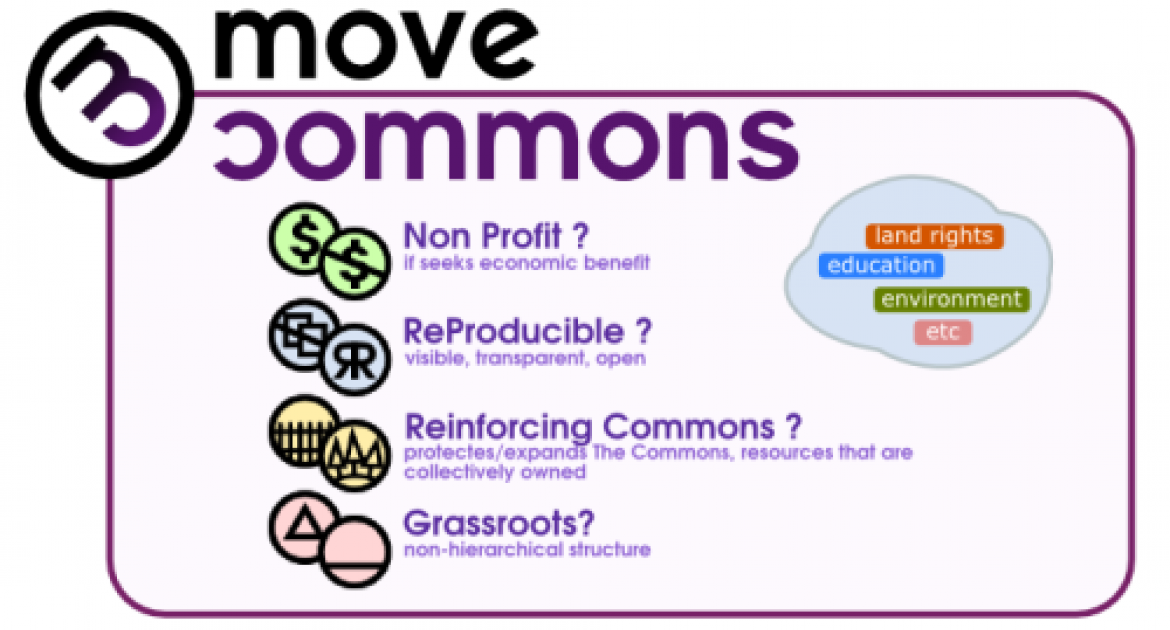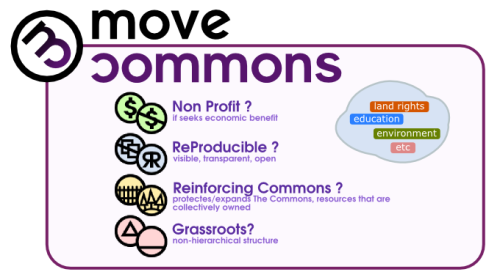Move Commons Work Group


Brief description
Move Commons (MC) is a simple tool for initiatives, collectives, NGOs, non-profits and social movements to declare the core principles they are committed to. MC follows the same mechanics as Creative Commons tags cultural works, providing a standard, user-friendly, bottom-up, self-labelling system for each initiative, with 4 meaningful icons, and some keywords. This presentation will present the current labelling system, explain how to adopt it and what benefits it could bring.
MC is still in alpha stage of development, so we are open to the feedback of the community on ways how to improve it, and to potential contributors that would like to join efforts. This initiative was developed under the umbrella of the Comunes association, and built by a diverse group of volunteers in several countries (among them, Javier de la Cueva).
Project development:
Here and there we see small initiatives promoting the Commons in different fields (open web, OER, free culture, or seeds). However, only a few have reached critical mass and thus can be well-known by different communities, while the majority are still in their corner, ignored by the mainstream. Move Commons (MC) is a weird idea which aims to boost the visibility and diffusion of such initiatives, and to "draw" the network among related initiatives/collectives across the world, allowing mutual discovery and facilitating the reach of critical mass for each field. Besides, any newcomer could easily understand the collective approach in their website, and/or discover collectives matching their field/location/interests inmovecommons.org.
MC follows the same mechanics as Creative Commons (CC) tags cultural works, providing a standard, user-friendly, bottom-up, self-labelling system for each collective/initiative, with four meaningful labels/icons, together with a complementary set of tags (keywords) and additional information to provide further classification (web address, geographical location...). Everything supported by a semantic web layer to allow searches such as, for instance: «which initiatives exist in Beirut that are a Grassroots organisation, Non-Profit, using Creative Commons, related to "alternative education" and "teen-agers"» (or other principles, keywords and places). The four principles/icons that each initiative can show and advertise that they are committed to are: Non-Profit/For-Profit; Reproducible/Exclusive; Grassroots/Representative; Reinforcing the Commons/Other Aims.
What we mean by the four principles: "Non-Profit" (otherwise: "For-Profit") recognizes if the initiative is volunteer-based and not profit-driven; "Reproducible" (otherwise: "Exclusive") refers to openness (using CC) and transparency (sharing their procedures to facilitate replication); "Grassroots" (otherwise: "Representative") indicates if the collective has a horizontal structure; "Reinforcing the Commons" (otherwise "Other Aims") highlights those that protects/expands/empower The Commons.
MC expects to provide a free platform where multiple extensions can be implemented, such as a recommender system of similar collectives, additional semantic web layers, geographical mapping, stats and graphs over the open data, network visualisation, web widgets, etc.



 Medialab-Matadero Madrid
Medialab-Matadero Madrid